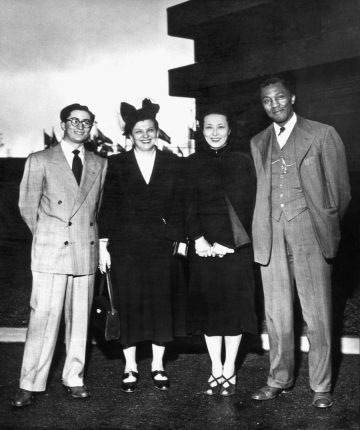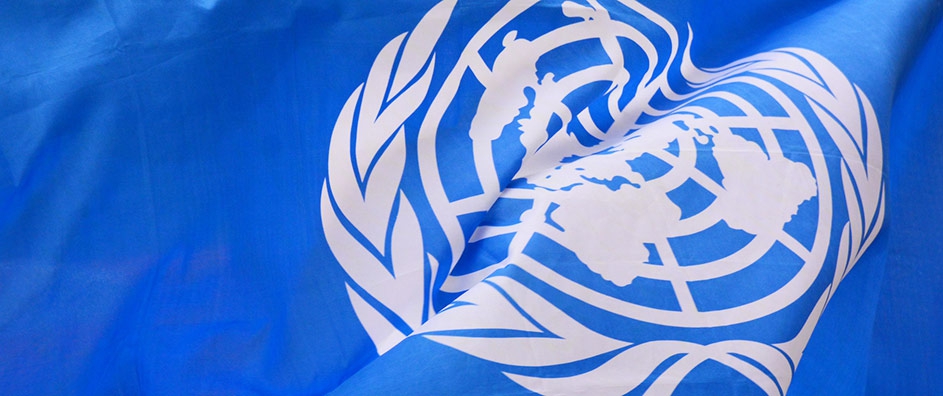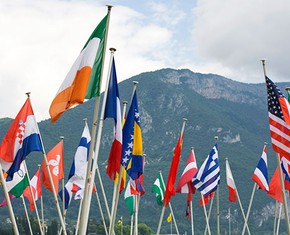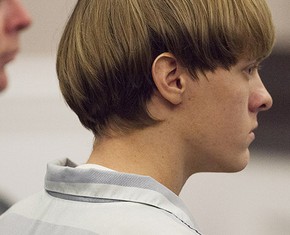The views expressed in our content reflect individual perspectives and do not represent the authoritative views of the Baha'i Faith.
For 72 years, we haven’t had a world war. Also, 72 years have passed since the formation of the United Nations. Coincidence?
To answer that question, let’s review some of the history of the United Nations. It had its beginnings both during and after the horror of World War II, the deadliest war in human history, when world leaders decided to do what they could to prevent World War III.
In the spring of 1945, those leaders began to construct the initial framework for the United Nations, as soon as it became likely that World War II would produce an Allied victory for the United States, England and Russia over the Axis powers of Germany, Italy and Japan. As World War II wound down, the United Nations Conference on International Organization, or UNCIO, hosted delegates from fifty Allied nations in San Francisco.
You can walk through that area today, now called UN Plaza. If you ever visit San Francisco, don’t miss it—that plaza once held all the peaceful hopes of humankind, and produced the seminal, noble document called the UN Charter, which begins like this:
We the peoples of the United Nations determined
- to save succeeding generations from the scourge of war, which twice in our lifetime has brought untold sorrow to mankind, and
- to reaffirm faith in fundamental human rights, in the dignity and worth of the human person, in the equal rights of men and women and of nations large and small, and
- to establish conditions under which justice and respect for the obligations arising from treaties and other sources of international law can be maintained, and
- to promote social progress and better standards of life …
There in UN Plaza, more than seven decades ago, nations first agreed on the framework for the establishment of a global organization to maintain peace and security in the world.
Do these goals sound familiar? They should, if you have a working knowledge of the Baha’i teachings, which include international agreement and unity between all nations; world peace enforced by a global government; human rights for all; the equality of women and men; the just observance of international treaties and agreements; and spiritual solutions to humanity’s economic and social problems.

Baha’i delegation to the United Nations International Conference of Non-Governmental Organizations. (L to R) Amin Banani, Mildred Mottahedeh, Hilda Yen and Matthew Bullock; Lake Success, NY, USA (April 1949)
That close resemblance between the Baha’i teachings and the first words of the Charter is no coincidence. Baha’is took part in the UN Charter and its signing in 1945. One Baha’i, Mildred Mottahedeh (1908-2000) was present in San Francisco when the initial participating nations signed the Charter, and later became the Baha’i International Community’s first accredited UN representative.
Designed to replace the League of Nations, that failed first attempt at creating a worldwide intergovernmental body, the UN Charter originally opened for signatures from the world’s governments on June 26, 1945. Five months later the UN Charter, with 51 nations on board, formally established the United Nations on October 24, 1945.
The Baha’i teachings had long foreseen these striking, world-embracing developments. When the UNCIO delegates met in 1945, few realized that Abdu’l-Baha had prophetically declared in San Francisco, a third of a century before, “May the first flag of international peace be upraised in this state.”
When the cornerstone of the United Nations’ permanent seat was laid in New York City in 1949, the Baha’is recalled Abdu’l-Baha’s visionary statement thirty-seven years earlier, declaring New York as the “City of the Covenant” and saying, in his address at the Astor Hotel to the New York Peace Society:
There is no doubt that … the banner of international agreement will be unfurled here to spread onward and outward among all the nations of the world. – The Promulgation of Universal Peace, p. 125.
This new birth of hope for world peace, security and cooperation resulted, as the Baha’i writings had foreseen, from the fiery ordeal of World War II, which killed 60 million people. The brutal devastation of the war had finally succeeded in implanting that sense of responsibility toward the well-being of humanity which leaders earlier in the century had sought to avoid.
Of course, the global fear induced by the invention and first use of nuclear weapons drove the UNCIO delegates to forge an agreement—which also evoked Abdu’l-Baha’s prescient predictions in North America that ultimately peace would come because the nations would be driven to accept it.
But can the United Nations actually unite the world? So far, no. Baha’is understand that the United Nations is far from perfect, and will require significant further evolution before it can match Baha’u’llah’s great vision of a just, unified, democratically-elected world governing body.
Without a doubt, though, the UN has helped prevent World War III. Since the establishment of the UN the world has suffered through many regional wars and conflicts, but the devastating specter of worldwide war has also been successfully averted for more than seven decades. What a great gift! In a world bristling with more and more deadly armaments, that accomplishment should make all humanity grateful. It should also give us a clue: humanity can, if we put our minds to it and our hearts into it, create the unity necessary to solve the world’s problems.
Today, financed by assessed and voluntary contributions from all of its member states, the UN maintains international peace and security in war and conflict zones, promotes and protects human rights, fosters social and economic development in the world’s poorest nations, protects the environment through the UN Environmental Programme, and provides massive humanitarian aid in cases of famine, natural disaster, and armed conflict.
So just try to imagine, as you stroll through UN Plaza in San Francisco, a world without the United Nations. With our shrinking planet’s growing economic, resource and environmental interdependence, and the looming, ever-present threat of world war, we would need to quickly invent an international body if we didn’t already have one.
You May Also Like
Comments

















The reason we have not had a full blown world war since the last one, which would undoubtedly involve ...nuclear weapons, is because such a war would not be profitable. Only the preparation for such a war is profitable and that is what we have been doing since WWII.